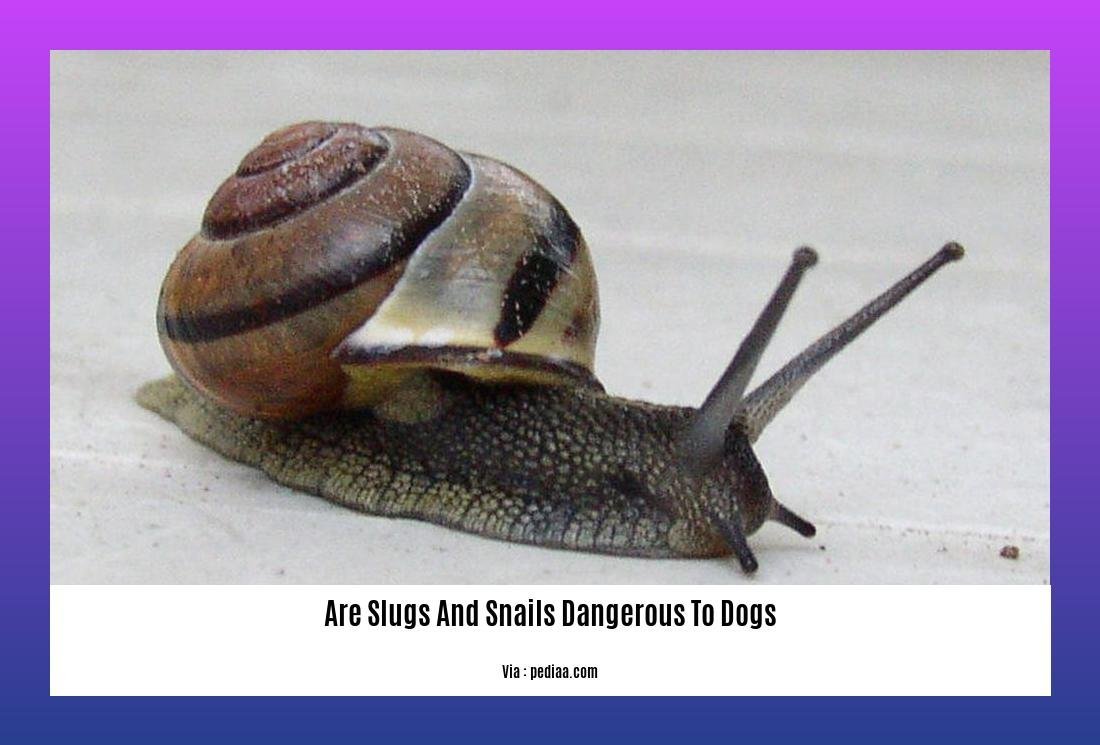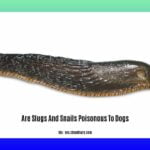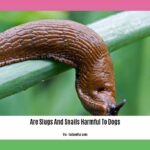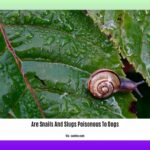Are Slugs and Snails Dangerous to Dogs? Protecting Your Furry Friend’s Health and Happiness
Discovering potential dangers lurking in your surroundings is a crucial aspect of responsible pet ownership, and when it comes to our furry friends, even the smallest creatures can pose a threat. As a seasoned veterinarian with extensive experience in pet care, I aim to shed light on a lesser-known hazard that could harm your beloved canine companion: slugs and snails. Understanding the risks they pose to dogs’ health and happiness is essential to ensure their well-being. In this article, I will delve into the potential dangers these slimy creatures can present and provide practical advice for protecting your furry friend from harm.
Key Takeaways:
- Slugs can transmit lungworms, a parasite that can be fatal to dogs if left untreated.
- Dogs can experience upset stomachs or poisoning if they ingest slugs that have eaten toxic pellets.
- It is recommended to take a dog to the vet for a check-up if they have ingested a slug, even if they show no signs of distress.
- Preventing slug infestation includes keeping the garden clean and removing decaying organic matter.
- Natural repellents and physical barriers can help deter slugs from entering the garden.
- Regular vet check-ups, proper grooming, and maintaining a clean living environment are important in preventing other parasites in dogs.
- Treatment for lungworms in dogs involves prescribed medication from a veterinarian.
- Slug tracks can be identified by their distinctive slime trails on surfaces like plants, soil, or outdoor furniture.
Are Slugs and Snails Dangerous to Dogs?
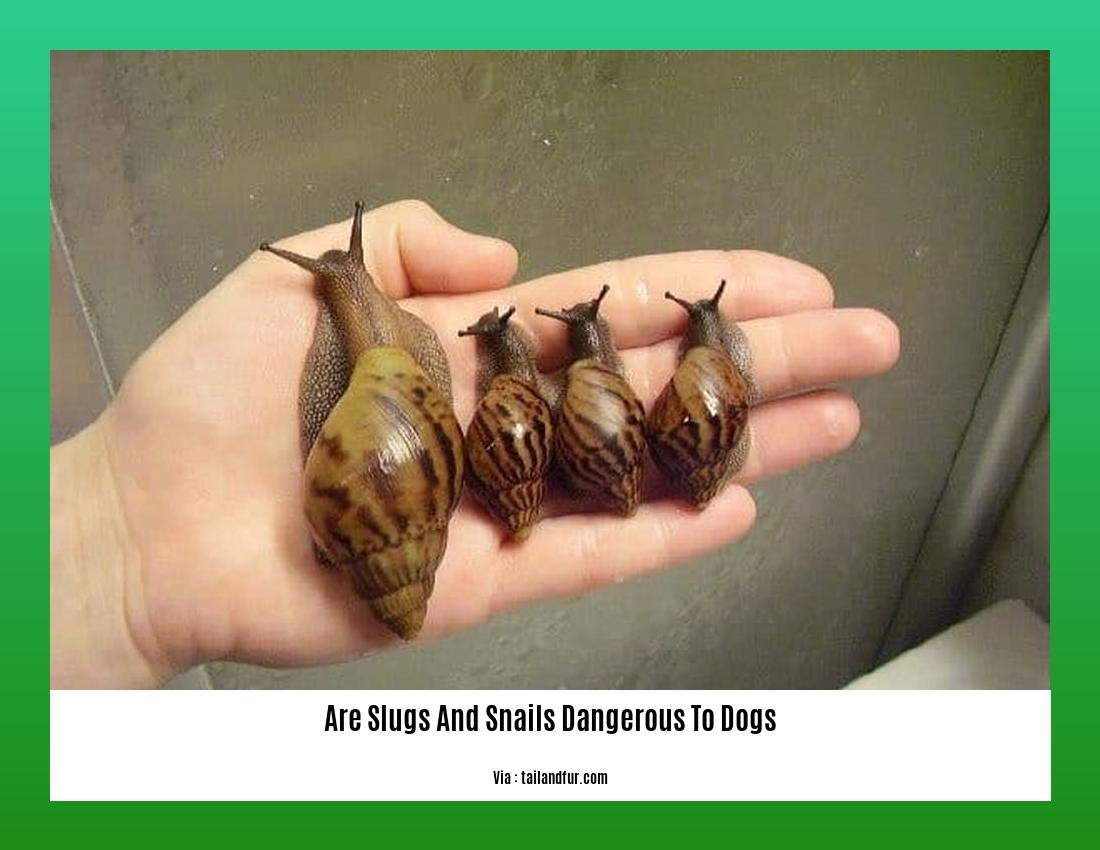
Slugs and snails may seem harmless, but they can actually pose risks to our furry friends. As a seasoned veterinarian, I wanted to shed light on the potential dangers these seemingly innocuous creatures can bring to dogs. In this article, we will explore why slugs and snails can be dangerous to dogs and provide practical advice on how you can protect your beloved pet’s health and happiness.
The Dangers of Slugs and Snails
One of the biggest concerns associated with slugs and snails is the transmission of lungworms. These parasites can invade a dog’s blood vessels in the lungs and heart, causing serious health issues. In fact, lungworms can even be fatal if left untreated. Therefore, it is crucial to be aware of the potential risks and take necessary precautions.
Aside from lungworms, slugs and snails can also cause upset stomachs or poisoning if they have ingested toxic pellets. Even if your dog doesn’t show immediate signs of distress after consuming a slug or snail, it is still recommended to take them to a vet for a check-up. Prompt veterinary care can help diagnose and address any underlying issues that may arise.
Taking Preventative Measures
Prevention is key when it comes to protecting your furry friend from the dangers of slugs and snails. Here are some practical tips to consider:
Maintain a clean garden: Slugs and snails thrive in environments with decaying organic matter. By keeping your garden clean and removing any potential hiding spots for these creatures, you can significantly reduce the risk of infestation.
Use natural repellents: There are various natural repellents available that can deter slugs and snails from entering your garden. Consider using substances like copper tape, diatomaceous earth, or coffee grounds to create barriers that these slimy critters won’t cross.
Be vigilant: Pay attention to your surroundings and identify slug tracks. Slugs leave distinctive slime trails on surfaces such as plants, soil, or outdoor furniture. By spotting these trails early on, you can take necessary actions to mitigate the risks.
Other Parasites to Be Aware of
While lungworms are a significant concern, dogs can also contract other parasites such as ticks, fleas, and intestinal worms. It is crucial to remain proactive in protecting your dog against these parasites. Here are some additional measures to consider:
Regular vet check-ups: Schedule regular visits to your veterinarian to ensure your dog’s overall health and to address any potential parasite-related issues. They can provide necessary vaccinations, conduct comprehensive examinations, and recommend appropriate preventive treatments.
Proper grooming: Regular grooming sessions not only keep your dog looking tidy but can also help in identifying and removing any external parasites such as ticks or fleas. Brushing your dog’s fur and inspecting their skin can go a long way in maintaining their well-being.
Maintain cleanliness: Ensure your dog’s living environment, including bedding and toys, is kept clean and free from any potential parasite infestations. Regularly wash their belongings and vacuum their living areas to minimize the risk of parasite transmission.
Seeking Veterinary Care and Treatment
If you suspect your dog has ingested a slug or snail, it is essential to seek veterinary care immediately. Even if your dog appears to be without distress, a professional evaluation can provide peace of mind and help identify any potential health issues that may not be immediately apparent.
Treatment for lungworms typically involves medication prescribed by a veterinarian. It is crucial to follow the instructions provided and complete the full course of treatment to ensure effective eradication of the parasite.
Conclusion
When it comes to the safety and well-being of our furry companions, being aware of potential dangers is crucial. Slugs and snails, though seemingly harmless, can pose significant risks to dogs. By understanding these risks and taking preventative measures, such as maintaining a clean garden and using natural repellents, you can help safeguard your dog’s health and happiness.
Remember, other parasites like ticks, fleas, and intestinal worms can also affect your dog’s health. Regular vet check-ups, proper grooming, and maintaining a clean living environment are important for prevention. If you suspect your dog has ingested a slug or snail, don’t hesitate to seek veterinary care. Together, we can ensure our beloved pets remain safe, healthy, and happy.
Are ramshorn snails good for ponds? Find out more about the benefits of having these snails in your pond here.
Are slugs and snails harmful to dogs? Learn about the potential dangers these creatures can pose to your furry friend here.
Are slugs and snails poisonous to dogs? Discover the potential toxicity that slugs and snails can have on your canine companion here.
Toxic substances secreted by slugs and snails
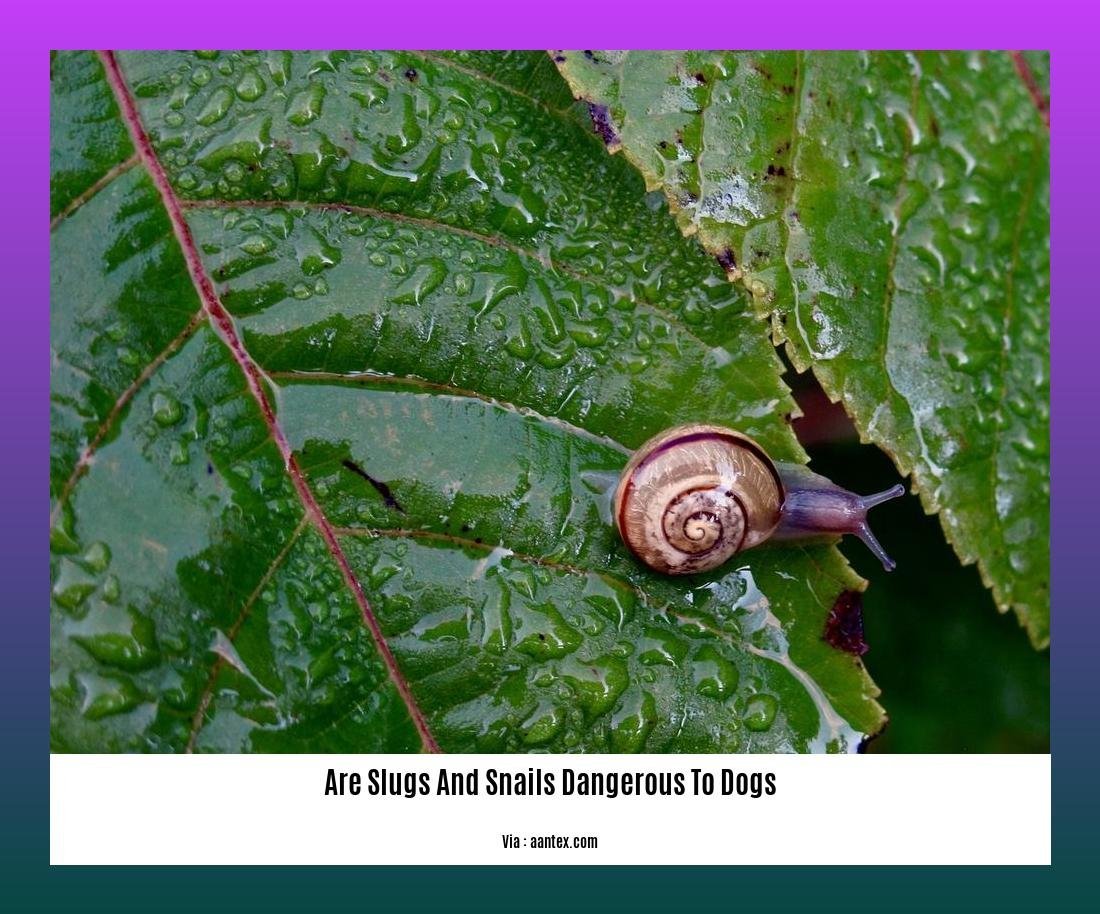
Slugs and snails are common creatures that can be found in our gardens and outdoor spaces. While they may seem harmless, it’s important for dog owners to understand the potential dangers that these slimy creatures can pose to their furry friends. In this article, we’ll explore the toxic substances secreted by slugs and snails and provide practical advice on how to protect your beloved pets.
What are the toxic substances secreted by slugs and snails?
Slugs and snails do not inherently contain toxic ingredients that are harmful to dogs. However, they can still cause issues if ingested. The real concern lies in the chemicals that are often used to control these pests. Some slug and snail poisons contain a compound called metaldehyde, which is highly toxic to cats and dogs, even in small amounts. Metaldehyde can be found in most snail and slug poisons, typically in green or blue-colored liquid or granular form.
The dangers of metaldehyde
Even a small amount of metaldehyde can be dangerous for dogs. For example, just consuming 1 ounce of a 3% metaldehyde product can cause toxicity in a 10-pound dog. It’s crucial to keep metaldehyde-based snail and slug poisons out of reach of pets and children, as accidental ingestion can have severe consequences.
Potential health issues for dogs
If dogs consume slugs or snails that have come into contact with metaldehyde-based poisons or other toxic chemicals, they may experience various health problems. Mild cases of slug or snail ingestion can result in gastrointestinal issues such as vomiting and diarrhea. In more severe cases, these toxic substances can affect the dog’s nervous system, leading to more serious health complications.
Safer alternatives for slug and snail control
Thankfully, there are safer options available for controlling slugs and snails that pose less risk to our pets. Slug and snail bait products containing iron phosphate are considered to be safer for pets. While they may still require caution and proper storage out of reach, iron phosphate-based baits are less toxic to animals. However, it’s important to note that larger doses of iron phosphate may be required to cause poisoning compared to metaldehyde-based baits.
Key Takeaways:
- Slugs and snails themselves do not contain toxic substances, but they can become impregnated with toxins if they have come into contact with chemical control measures.
- Metaldehyde is a highly toxic compound found in many snail and slug poisons.
- Eating even small amounts of metaldehyde can be harmful and potentially fatal to dogs.
- Symptoms of slug or snail ingestion can range from mild gastrointestinal issues to more serious complications affecting the nervous system.
- Safer alternatives for slug and snail control include baits containing iron phosphate.
Ultimately, the well-being of our canine companions is our priority. By understanding the potential dangers posed by toxic substances secreted by slugs and snails, dog owners can take proactive measures to protect their furry friends. Regularly monitoring their environment, using pet-friendly pest control options, and seeking veterinary care if ingestion occurs can all contribute to keeping our dogs healthy and happy. Stay informed, stay vigilant, and let’s keep our pets safe from unnecessary harm.
Relevant Sources:
- Preventive Vet – Snail & Slug Bait – Poisonous For Pets
- Vet Explains Pets – Are Slugs Poisonous to Dogs?
Symptoms of Slug and Snail Poisoning in Dogs
When it comes to the safety and well-being of our furry friends, it’s important to be aware of the potential dangers they may face. In the case of slugs and snails, while they may not be inherently poisonous to dogs, there are risks associated with their consumption.
Recognizing the Symptoms
The symptoms of slug and snail poisoning in dogs can vary and may include:
- Anxiety: Dogs may exhibit signs of restlessness or unease.
- Collapse: Dogs may suddenly collapse or become weak.
- Convulsions: Seizures or tremors may occur.
- Diarrhea: Loose stools and gastrointestinal upset may be present.
- Difficulty Breathing: Dogs may experience respiratory distress.
- Disorientation: Confusion and disorientation can be observed.
- Drooling: Excessive drooling may occur.
- Loss of Appetite: Dogs may lose interest in food.
- Vomiting: Dogs may vomit or regurgitate.
In more severe cases or if left untreated, slug and snail bait poisoning can even lead to death. Time is of the essence, so it is crucial to seek immediate veterinary evaluation if you suspect your dog has consumed slug or snail bait.
Lungworm Infection and Other Risks
In addition to slug and snail bait poisoning, dogs can also become infected with lungworms by consuming slugs or snails, as well as through contaminated water or environments. They can even contract lungworms by consuming another animal that has ingested a slug. It’s important to be aware of the potential risks associated with lungworm infection in dogs.
Taking Precautions
To protect your furry friend from these potential dangers, there are some precautions you can take:
- Use pet-safe slug and snail bait products, preferably those containing iron phosphate instead of metaldehyde, which is more toxic to pets.
- If metaldehyde-based baits are used, store them securely out of reach of children and pets.
- Reduce the risk of slug contact for your dog by keeping their toys indoors at night, as slugs are more active in damp conditions.
- Tidy away dog toys each night to minimize the risk of slugs infected with lungworm crawling over them.
By adopting these preventative measures, you can ensure the safety and well-being of your beloved canine companion.
Key Takeaways:
- Slugs and snails themselves are not poisonous to dogs, but their consumption can pose risks.
- Symptoms of slug and snail poisoning in dogs may include anxiety, collapse, convulsions, diarrhea, difficulty breathing, disorientation, drooling, and loss of appetite.
- Slugs and snails can transmit lungworms to dogs, which can be potentially fatal if left untreated.
- Slug and snail bait products containing iron phosphate are generally safer for pets, but precautions should always be taken.
- Seek immediate veterinary care if you suspect your dog has consumed slug or snail bait or is showing symptoms of poisoning or infection.
Sources:
[^1^]: “Slug and Snail Bait Poisoning in Dogs – Symptoms, Causes, Diagnosis, Treatment, Recovery, Management, Cost.” (wagwalking.com)
[^2^]: “Snail & Slug Bait – Poisonous For Pets.” (preventivevet.com)
Preventive Measures to Protect Dogs from Slugs and Snails
Gardens can be a haven for slugs and snails, and these pesky creatures can pose potential risks to our furry companions. As a responsible dog owner, it’s essential to take preventive measures to protect your beloved pet from the dangers associated with slugs and snails. In this article, we will discuss practical methods to safeguard your dog’s health and happiness.
Signs of Slugs and Snails
The first step in protecting your dog is to be able to recognize the signs of slugs and snails. Keep an eye out for slimy trails, plant damage, and the presence of slugs or snails in your garden or on your dog. By being vigilant and observant, you can take prompt action to eliminate these pests and prevent any potential harm to your furry friend.
Regular Treatment against Parasites
One effective preventive measure is to ensure that your dog receives regular treatment that is specifically effective against slugs and snails. This helps in preventing any potential harm caused by these parasites. Consult with your veterinarian to find the most suitable treatment option for your dog’s needs.
Reduce Contact
Minimizing your dog’s contact with slugs and snails is another crucial step. Keep your garden clean and tidy, as slugs and snails are attracted to damp and cluttered areas. Avoid walking your dog in areas where slugs and snails are commonly found, and always promptly remove any slugs or snails that you come across. By reducing contact, you can significantly decrease the chances of your dog encountering these pests.
Organic Pest Control
Opting for natural and organic pest control methods is not only safe for your dog but also for children, wildlife, and the environment. Chemical-based pest control products can pose risks to the well-being of these vulnerable beings. Instead, consider using alternative methods such as:
Copper barriers: Create a barrier using copper tape or strips around your garden beds. Slugs and snails are repelled by the electric charge produced by the copper, helping to keep them away from your plants and your dog.
Diatomaceous earth: Sprinkle diatomaceous earth around your garden, focusing on areas where slugs and snails are likely to be present. This natural powder works by dehydrating the pests, ultimately deterring them from coming near your dog.
Beer traps: Set up beer traps by burying small containers, such as yogurt cups, in the ground and filling them with beer. Slugs and snails are attracted to the scent of the beer and will crawl in, eventually drowning. Remember to regularly empty and refill the traps to maintain their effectiveness.
Benefits of Organic Pest Control
Opting for organic pest control methods offers several advantages:
Safe for pets, children, and wildlife: Unlike chemical-based pest control products, organic methods do not contain harmful chemicals that can harm your pets, children, or wildlife. You can have peace of mind knowing that you are keeping them all safe.
Environmentally friendly: Organic pest control methods prioritize the well-being of the environment. By using natural solutions, you contribute to minimizing pollution and preserving natural ecosystems.
Key Takeaways:
- Regular treatment against parasites helps protect your dog from potential harm caused by slugs and snails.
- Minimize your dog’s contact with slugs and snails by keeping your garden clean and promptly removing any pests you come across.
- Opt for natural and organic pest control methods such as copper barriers, diatomaceous earth, and beer traps to deter and eliminate slugs and snails from your garden.
- Organic pest control is safe for pets, children, wildlife, and the environment.
Sources:
– Cooper & Gracie – How to Stop Your Dog from Eating Slugs
– Preventive Vet – Snail & Slug Bait – Poisonous For Pets
FAQ
Q1: Can slugs and snails transmit diseases to dogs?
A1: Yes, slugs and snails can transmit diseases to dogs. They can carry lungworms, which are parasites that can cause serious health issues in dogs, including damage to their blood vessels in the lungs and heart.
Q2: What are the symptoms of lungworm infection in dogs?
A2: The symptoms of lungworm infection in dogs can vary, but they may include coughing, difficulty breathing, weight loss, poor appetite, lethargy, and changes in behavior. It is important to seek veterinary care if you suspect your dog has been infected with lungworms.
Q3: How can I prevent my dog from ingesting slugs and snails?
A3: To prevent your dog from ingesting slugs and snails, it is important to keep your garden clean and free of decaying organic matter where slugs may thrive. You can also use natural repellents or physical barriers to deter slugs from entering your garden.
Q4: What should I do if my dog has eaten a slug or snail?
A4: If your dog has eaten a slug or snail, it is recommended to take them to a veterinarian for a check-up, even if they are not showing any signs of distress. The veterinarian can assess any potential risks and provide appropriate treatment or advice.
Q5: Are there any pet-friendly methods to control slugs and snails in my garden?
A5: Yes, there are pet-friendly methods to control slugs and snails in your garden. You can use organic pest control methods such as copper barriers, diatomaceous earth, or beer traps. These methods are safe for your pets, children, and wildlife.
- Revolution Space: Disruptive Ion Propulsion Transforming Satellites - April 24, 2025
- Race Through Space: Fun Family Game for Kids - April 24, 2025
- Unlocking the Universe: reading about stars 6th grade Guide - April 24, 2025
